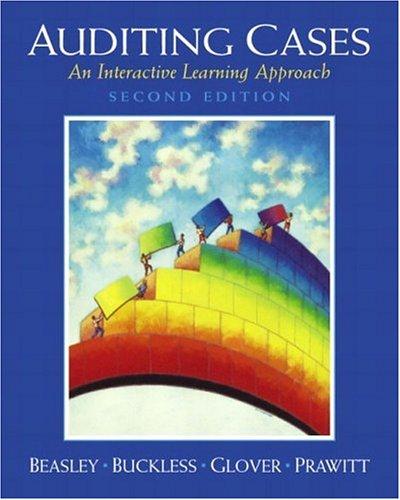Question
Scheerer v. Fisher Case Background Scheerer, a real estate agent, helped arrange for Fisher to buy some com- mercial real estate for $20 million. The
Scheerer v. Fisher
Case Background Scheerer, a real estate
agent, helped arrange for Fisher to buy some com- mercial real estate for $20 million. The property seller and Fisher, the buyer, each promised to pay Scheerer a two percent commission, but the deal fell apart be- fore it was completed. Fisher then formed a new company and had a third party, Antonio, buy the property and sell it to Fisher's new company. Scheerer learned of the deal, from which he got no commission, and sued for breach of contract or quantum meruit for
reasonable compensation. The trial court held there was no contract or basis for payment to Scheerer. He appealed.
Case Decision Calabria, Judge.
Court of Appeals of North Carolina 688 S.E.2d 471 (2010)
* * *
Plaintiffs argue that the trial court erred in dismissing their claim of quantum meruit for failure to state a claim upon which relief can be granted. We agree.
"Under Rule 8(a)(2) of the North Carolina Rules of Civil Procedure, plaintiff[s] [are] entitled to seek alter- native forms of relief."...If plaintiffs' allegations in their claim for quantum meruit are accepted as true, no contract exists and quantum meruit is not ex- cluded as a remedy per se.
"Recovery in quantum meruit will not be denied where a contract may be implied from the proven facts but the express contract alleged is not proved." The rationale for allowing a plaintiff to plead both breach of express contract and breach of implied contract is that if the plaintiff "fails to prove the exis- tence of an express contract, he or she is not fore- closed from recovery in quantum meruit if a contract can be implied and the reasonable value of his or her services can be drawn from the evidence."
To recover in quantum meruit, plaintiffs must show: (1) services were rendered to defendants; (2) the services were knowingly and voluntarily accepted; and (3) the services were not given gratuitously. In short, if plaintiffs alleged and proved acceptance of ser- vices and the value of those services, they were enti- tled to go to the jury on quantum meruit....
In the instant case, as to their claim for quantum meruit, plaintiffs alleged that: (1) defendants had a
prior professional relationship with Scheerer and
therefore knew Scheerer was a real estate agent; (2) defendants knew plaintiffs were working on behalf of defendants to find property suitable for defendants to purchase; (3) plaintiffs told defendants that such prop- erty was for sale; (4) both parties expected plaintiffs to be paid a commission for their work; and (5) defen- dants were ready, willing, and able buyers and in fact purchased the properties located by plaintiffs.
...The undisputed facts establish conduct dem- onstrating that defendants took action to deny Scheerer compensation that was earned for the ser- vices he rendered. Although the original contract he negotiated failed to close, the law implies a promise to pay some reasonable compensation for services rendered. Plaintiffs' allegations state a valid claim for relief in quantum meruit....
Reversed.
Questions for Analysis
1. There was no written contract involving Scheerer and the purchase of the property by Fisher from Antonio, so why should Scheerer receive payment?
2. Does the quantum meruit rule allow many parties to claim they were cheated out of a deal, thereby generating a lot of litigation? Is this a fair rule?
Step by Step Solution
There are 3 Steps involved in it
Step: 1

Get Instant Access with AI-Powered Solutions
See step-by-step solutions with expert insights and AI powered tools for academic success
Step: 2

Step: 3

Ace Your Homework with AI
Get the answers you need in no time with our AI-driven, step-by-step assistance
Get Started


